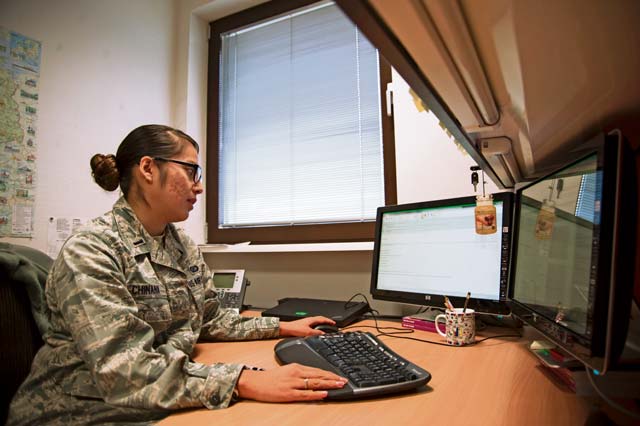
From a distance, service members can be hard to distinguish. They wear identical uniforms, have similar haircuts and are all held to the same set of rules and standards, but the Department of Defense recognizes the diversity among service members and civilian employees during monthlong heritage observations.
November is designated as National Native American Heritage Month to acknowledge their contributions and accomplishments.
“The DOD is really committed to celebrating all sorts of diversity — race, ethnicity, gender, sexual orientation,” said Joe Sarcinella, the DOD’s senior adviser and liaison for Native American affairs, in a previous interview. “I really feel they’re leading the charge, and November just happens to be the time of the year when we can focus on Native Americans.”
First Lt. Delilah Chinana’s culture from the Pueblo of Jemez in New Mexico differs from most Americans, but Chinana, a 521st Air Mobility Operations Wing contract airlift and terminal ops chief, said it’s something she holds dear and hopes others look to her as a model of what they can accomplish.
“Being Native American means a lot to me,” Chinana said. “It means I have a culture my family has kept intact. The traditions they’re teaching me is something they learned from their grandparents and something I can teach my children in the future.
“I think I set an example for the younger generation back home,” she continued. “I hope they see the Air Force as an opportunity to experience new things. People tend to be afraid when they don’t know what’s out there. Maybe seeing someone like me will give them that boost.”
Since joining the Air Force, Chinana has experienced different cultures and shared her culture with others around the world.
“It is interesting to learn how my culture is similar or different to the places I have visited,” she said. “The culture in Japan is so beautiful, and it was amazing to find out they had celebrations for things similar to what my family has; even types of food were similar to our traditional dishes. It is an amazing experience to have with people from another world to find out how different yet similar we are. Likewise, they were also interested to meet someone of my heritage. Most people don’t know we still exist.”
Native Americans have had a profound impact in the history of the U.S. military and continue that tradition to this day.
“The Navajo code talkers is what stands out to me when I think about Native Americans that have made big differences in the military,” Chinana said. “Also, one of the Marines that raised the flag on Iwo Jima during World War II was Native American. Within my family, serving is a big deal. My dad retired after 24 years of service in the Army and he’s the reason I joined.”
In her uniform Chinana may look like every other Airman, but deeper inside is an individual with a rich heritage, and she is a vital member of the Air Force.







